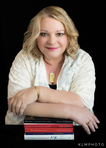© Christy K. RobinsonThe sacrifice of Mary Dyer's life in 1660 had direct bearingon the Rhode Island Charter of 1663 which legally granted liberty ofconscience, and eventually on the United States Constitution's Bill of Rights, ratified in 1791.
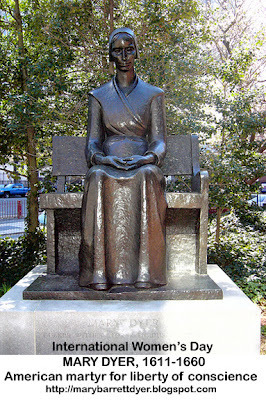 How and why did Mary Dyer die?
How and why did Mary Dyer die?
Click: Top 10 Things You May Not Know About Mary DyerIn an article on Major William Dyre (son of William and MaryDyer), by Colonel J. Granville Leach, LL.B., is this paragraph:
AnEnglish writer has said: "The most important fact concerning Mary Dyre is that of her murder having been the motive of the wonderfully liberalcharter granted by Charles II to the province of Rhode Island, makingit the first spot whereon religious toleration andabsolute freedom of worship were established by law." Source:
Americanhistorical register monthly gazette: historical, military, patriotic-hereditarysocieties, United States of America (various authors)
Whoever that English writer was, I agree with hisassumption. Mary Dyer's choice to die a shameful death in order to shock andoutrage the Massachusetts public into understanding that her brothers andsisters in the faith were only carrying out the gospel commission (visiting thesick and imprisoned, treating the "least" members of society as they wouldtreat their Lord, and proclaiming the Light of the world), was described in abooklet that was sent to King Charles II of England, their monarch. EdwardBurrough wrote
A Declaration of the Sadand Great Persecution and Martyrdom of the People of God, called Quakers, in New-England, forthe Worshipping of God, which you can
download here. The immediateeffect of the King reading the booklet was his directive to stop the hangingsentirely. It also slowed and lessened the other torture on religious dissentersfor a few years.
After civil wars in Englandand two decades of parliamentary (puritan) rule, Charles had been restored tothe English throne in 1660, and was crowned in Londontwo days before Mary was hanged in Boston.Although nominally the head of the Church of England, his beliefs wereinherited from his French Catholic mother, Queen Henrietta Maria, and furtherformed during his exile in Catholic France.
The puritan English Parliament during the interregnum wouldnot grant a charter that included religious liberties, and Charles II was notvery keen on it, either—until, with the combination of Mary's death as described by Edward Burrough, and Dr.John Clarke's persistence, he granted the Rhode Island charter in 1663. (I prefer tothink he was more high-minded and sympathetic with Rhode Islanders, than punitiveto the puritan Parliamentarians who had beheaded his father.)
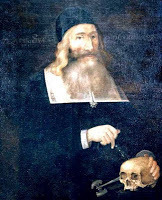 Dr. John Clarke, architect of the
Dr. John Clarke, architect of the
1663 Rhode Island charterHaving read several pieces written by
William Dyer (Mary'shusband), I believe that some of the provisions of the 1663 charter ofliberties granted by King Charles II to Rhode Island and Providence Plantationswere not only the invention of Dr. John Clarke (architect and primary author ofthe charters) and Roger Williams (founder of Providence Plantations, governor,and respected thought-leader of Rhode Island colony), but pet issues of WilliamDyer's, particularly after the repeated imprisonment and eventual execution ofhis wife, Mary. (Dyer is mentioned twice in the charter, along with two dozenother men who were purchasers, founders, and principal men of Rhode Island.)
Freedom of conscience to worship (or not) as they thought best. Dissent from Church of England beliefs, without penalty, is allowed. Settlers/pioneers left England for religious freedom and to work hard for a new life (risking lives and fortunes), but were ejected from Massachusetts for religious reasons and had to start over again in perilous circumstances. Shipping and Newport's seaport trade. Right of free passage through New England colonies (this nullifies the banishment orders of Massachusetts).
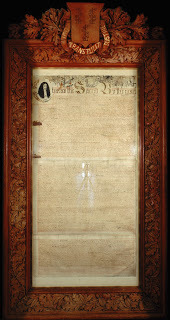 1663--Rhode Island's
1663--Rhode Island's
royal charter (click to enlarge)This is the portion of the 1663 Charter (constitution) forRhode Island Colony that grants a separation between civil and religiousmatters, and the liberty to believe and practice religion as they believedbest. Though framed by Dr. Clarke and Rev. Williams, it's written in the"voice" of King Charles II, as he was granting the rights to his colony.
Andwhereas, in theire humble addresse, they have ffreely declared, that it is muchon their hearts (if they may be permitted), to hold forth a livlie experiment,that a most flourishing civill statemay stand and best bee maintained, and that among our English subjects. with a full libertie in religious concernements;and that true pietye rightly grounded upon gospell principles, will give thebest and greatest security to sovereignetye, and will lay in the hearts of menthe strongest obligations to true loyaltye: Now know bee, that wee beingewillinge to encourage the hopefull undertakeinge of oure sayd lovall andloveinge subjects, and to secure them inthe free exercise and enjovment of all theire civill and religious rights,appertaining to them, as our loveing subjects; and to preserve unto them thatlibertye, in the true Christian ffaith and worshipp of God, which they havesought with soe much travaill, and with peaceable myndes, and lovallsubjectione to our royall progenitors and ourselves, to enjoye; and because some of the people and inhabitants of thesame colonie cannot, in theire private opinions, conforms to the publiqueexercise of religion, according to the litturgy, formes and ceremonyes ofthe Church of England, or take or subscribe the oaths and articles made andestablished in that behalfe; and for that the same, by reason of the remotedistances of those places, will (as wee hope) bee noe breach of the unitie andunifformitie established in this nation:Have therefore thought ffit, and doe hereby publish, graunt, ordeyne anddeclare, That our royall will and pleasure is, that noe person within the sayd colonye, at any tyme hereafter, shall beeany wise molested, punished, disquieted, or called in question, for anydifferences in opinione in matters of religion, and doe not actually disturbthe civill peace of our sayd colony; but that all and everye person andpersons may, from tyme to tyme, and at all tymes hereafter, freelye and fullye have and enjoye his andtheire owne judgments and consciences, in matters of religious concernments,throughout the tract of land hereafter mentioned; they behaving themselvespeaceablie and quietlie, and not useing this libertie to lycentiousnesse andprofanenesse, nor to the civill injurye or outward disturbeance of others; anylawe, statute, or clause, therein contayned, or to bee contayned, usage orcustome of this realme, to the contrary hereof, in any wise, notwithstanding.
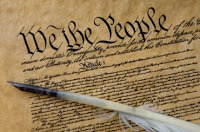
Rhode Islandbecame a sanctuary for people who had been persecuted elsewhere for theirconvictions. One hundred thirty years after the charter, America's"Founding Fathers" (actually, I prefer the first colonials to have that title,but it's not my call!) framed a constitution and the amendments to it calledthe Bill of Rights, based in part on the Magna Carta, the Rhode island charter,other documents, and some very creative, brilliant thinking.
The first amendment to the US Constitution is:"Congress shall make no law respecting an establishment of religion, orprohibiting the free exercise thereof; or abridging the freedom of speech, orof the press; or the right of the people peaceably to assemble, and to petitionthe Government for a redress of grievances."
When you hear the words "First Amendment rights," rememberMary Dyer, and that she and her cause were the motive for separation of churchand state in America,and freedom to worship and speak according to your conscience.

 newest »
newest »
 newest »
newest »
 Wow, they got it right! Almost 352 years later there are still well intentioned folks who none-the-less want the government to establish a state religion and limit free speech. Thanks to "first colonials" and the "founding fathers" who recognized this human trait/flaw and included the protection against it in the first ammendment.
Wow, they got it right! Almost 352 years later there are still well intentioned folks who none-the-less want the government to establish a state religion and limit free speech. Thanks to "first colonials" and the "founding fathers" who recognized this human trait/flaw and included the protection against it in the first ammendment.






